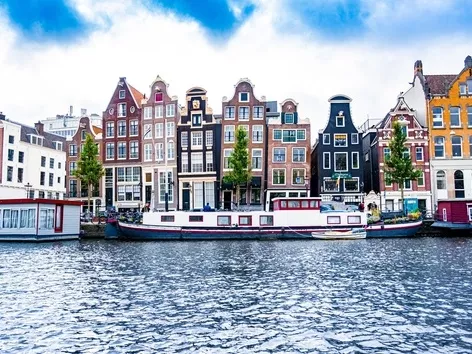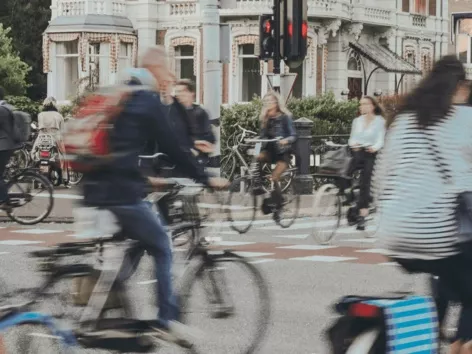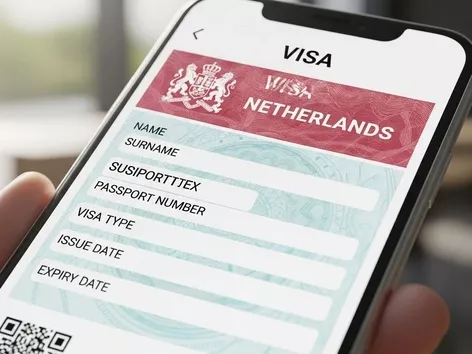Studying in the Netherlands in 2025: how to enroll, get a student visa and choose the best university
Table of contents
- How many international students are studying in the Netherlands?
- Types of student visas to the Netherlands (MVV and residence permit)
- Requirements for obtaining a student visa to the Netherlands
- Step-by-step process for applying for a student visa
- Required documents for a student visa to the Netherlands
- Student visa application processing time
- How much does it cost to study in the Netherlands?
- The best universities in the Netherlands for foreigners
- When to apply to study in the Netherlands?
- Popular study programs among international students
- Do you need to know the language to study in the Netherlands?
- Prospects after graduation
- What else should you consider when applying to the Netherlands?

Studying in the Netherlands attracts thousands of students from all over the world due to the high quality of education, English-language programs and international opportunities. Find out how to enter a university in the Netherlands as a foreigner in 2025, get a student visa, choose a program and find the best universities
The Netherlands has been one of the most popular destinations for higher education in Europe for many years. The country attracts students from all over the world, including citizens of Spain, Afghanistan and Tunisia, with its high quality of teaching, international programs in English, modern campuses and a practical approach to learning. In addition, after graduating from university, foreigners have excellent career and employment opportunities in the EU.
In this article, we will look at how a foreigner can enter a Dutch university, get a student visa in 2025, what deadlines for submitting documents should be taken into account, and also what programs and universities are chosen by students from abroad.
All international students in the Netherlands are required to have health insurance that covers the entire period of study and stay. Apply for your policy online quickly and conveniently through Visit World and be confident in your protection today!
How many international students are studying in the Netherlands?
In the 2024-2025 academic year, more than 131,000 international students are studying in the Netherlands, and this number continues to grow. The largest number of students come from Germany, China, Italy, Greece and Ukraine. The country ranks among the first in Europe in terms of the share of international students in the total number of those studying at higher education institutions.
Types of student visas to the Netherlands (MVV and residence permit)
The Netherlands offers several types of student visas depending on the duration of the study program. Choosing the right type of visa depends on whether you are planning short-term courses or a full-time educational program at a higher education institution.
Short-term Schengen visa
A short-term Schengen visa to the Netherlands is issued to students who plan to stay in the country for less than 90 days. It is usually used to participate in:
- Short-term educational or language courses;
- Exchange programs;
- Conferences, seminars or summer schools;
- Short academic visits or research projects.
Citizens of EU/EEA countries and Switzerland do not need this visa - they have the right to travel and study freely within the Schengen area. However, third-country nationals planning to stay for more than 90 days must apply for a long-term visa (MVV).
Student visa for secondary and vocational education
International students planning to study at secondary schools, colleges or vocational training programs must apply for the appropriate type of student visa. This may be required for:
- International secondary education programs;
- Vocational or technical training courses;
- Preparation programs for admission to higher education institutions;
- Professional development or retraining courses.
Application procedures vary by institution, so before applying, it is important to clarify which type of visa you need and what requirements apply to your chosen program.
Long-term student visa (MVV) and residence permit
For study programs lasting more than 90 days, international students need to apply for a long-term MVV visa (Machtiging tot Voorlopig Verblijf) together with a residence permit. This is the most common option for international students, and covers:
- Bachelor's and Master's degree programs;
- Postgraduate and doctoral studies;
- Long-term exchange and research programs.
The MVV acts as an entry visa and a temporary residence permit. It is usually valid for up to six months, during which time the student must apply for a full residence permit that will cover the entire period of study.
Requirements for obtaining a student visa to the Netherlands
To obtain a student visa, foreign applicants must meet a number of requirements set by the Dutch Immigration and Naturalization Service (IND).
1. Acceptance at an accredited educational institution
The student must be officially enrolled at a university, college or school recognized by the Dutch government. The university provides a Letter of Acceptance, which is the main document for applying for a visa.
2. Academic qualifications
It is necessary to prove that the previous education meets the level of the requirements of the chosen program. To do this, certified copies of diplomas, certificates, academic transcripts and, if necessary, their translations into English or Dutch are submitted.
3. Language proficiency
Most universities offer programs in English. For admission, you must provide the results of international tests - IELTS (minimum 6.0-6.5) or TOEFL (minimum 80 points iBT). Some programs may require higher results or an additional language interview.
4. Financial guarantees
The applicant must confirm that he has enough funds to cover the costs of accommodation, tuition, health insurance and transport.
As of the 2024/2025 academic year, the IND has set a minimum level of financial security of 1094.12 euros per month. This amount may change each year.
Confirmation can be:
- bank statements;
- letters of scholarship;
- financial guarantees from sponsors or relatives.
5. Health insurance
Health insurance is a mandatory requirement for all international students. The policy must meet Dutch standards and be valid for the entire period of stay in the country. Universities often help students arrange insurance through partner companies.
Step-by-step process for applying for a student visa
Step 1 – Obtain official confirmation of enrollment from an accredited educational institution.
Step 2 – Gather a package of documents, including financial statements, insurance policy, and copies of diplomas.
Step 3 – The university applies on your behalf to the Immigration Service (IND) for a residence permit and, if necessary, an MVV.
Step 4 – Pay the visa fee (approximately €174 for an MVV and €243 for a residence permit).
Step 5 – Visit a Dutch embassy or consulate for biometrics and a short interview.
Step 6 – Wait for the IND’s decision, which usually takes between 2 and 12 weeks, depending on the country.
Step 7 – Obtain your visa and check that all details are entered correctly before you travel.
Required documents for a student visa to the Netherlands
To apply for a student visa to the Netherlands, you usually need:
- a completed visa application form;
- a valid passport (at least two blank pages);
- two passport-sized photos;
- a letter of confirmation of enrollment;
- a certificate of health insurance;
- documents confirming financial capacity;
- academic documents;
- proof of residence (lease agreement or letter from the university).
All documents issued in languages other than English or Dutch must be translated by a certified translator.
Student visa application processing time
The IND usually processes applications from 14 days to 90 days. If the university is an accredited partner of the IND, the procedure can be accelerated to 2-4 weeks. It is recommended to submit documents in advance - at least three months before the start of studies.
How much does it cost to study in the Netherlands?
The Netherlands has one of the most transparent approaches to financial criteria for students. The amount of €1,094.12 per month covers the minimum costs of accommodation, food, transport and personal needs. In addition:
- Average tuition fees for international students – from €8,000 to €15,000 per year (depending on the program);
- Visa fees – €174 (MVV) and €243 (residence permit);
- Health insurance – from €40 to €100 per month.
The best universities in the Netherlands for foreigners
The Netherlands is famous for its high level of education, modern campuses and a large number of English-language programs. Below is a selection of the country's leading universities that are most often chosen by international students in 2025:
1. TU Delft (Delft University of Technology)
One of the best technical universities in Europe. Strong areas are engineering, architecture, technology, robotics. It has a powerful laboratory base and participates in numerous international research projects.
2. University of Amsterdam (UvA)
Offers a wide range of English-language programs, especially in the fields of social sciences and humanities, business, media and international relations. The campus in the center of Amsterdam attracts students from all over the world.
3. Wageningen University & Research
A recognized leader in the fields of agriculture, ecology, food technology and climate sciences. One of the best "green" universities in the world.
4. Leiden University
One of the oldest universities in Europe with a rich tradition. Strong programs in law, humanities and social sciences, international law and politics.
5. Erasmus University Rotterdam
Known for its business schools and research in economics, management, logistics and sociology. Has numerous exchange partner programs with universities around the world.
6. Utrecht University
One of the leading research universities in the country, offering interdisciplinary programs and opportunities to participate in scientific projects.
7. University of Groningen
A great option for students looking for quality education at a more affordable price. Has a large student campus and offers strong programs in science, economics, IT and medicine.
Tip! When choosing a university, you should pay attention to the “rating of a specific program”, admission requirements, availability of practice or internship, level of support for international students (language courses, housing, adaptation programs).
When to apply to study in the Netherlands?
For most bachelor's programs through Studielink, the typical deadline is January 15 for autumn studies.
Master's programs may have different deadlines: often applications are submitted from late winter to spring (February - May). Some universities have early deadlines, especially for highly specialized programs or with a limited number of places.
There may also be early deadlines for applying for scholarships or grants, which often have separate deadlines.
Popular study programs among international students
- Engineering / Technology / Engineering Sciences - areas such as mechanical engineering, energy, production technology, electrical engineering, etc.
- Life Sciences / Agricultural & Environmental Sciences - ecology, agricultural sciences, food technology.
- Business / Management / Economics - international business, finance, marketing, logistics.
- Computer Science / Data Science / AI / Software Engineering - very high demand, new programs are opened almost every year.
- Social Sciences / International Relations / Political Science / Law – for those planning a career in international organizations, NGOs, governments.
- Health Sciences / Public Health – especially master’s programs.
English-language master’s programs are a huge plus for international students; bachelor’s degrees in English are less common, but they also exist.
Do you need to know the language to study in the Netherlands?
If the program is in English – knowledge of Dutch is often not required for the academic part. However, a confirmed level of English (IELTS, TOEFL or equivalent) is required.
If the program is in Dutch – you need to have a certificate or prove your knowledge of Dutch.
Even if you are in an English-language program – basic knowledge of Dutch (for example, for everyday communication, life, part-time work or internships) can be very useful.
In some large cities, students often receive help from Dutch or language support courses.
Prospects after graduation
Orientation year / Zoekjaar – one year after completing your bachelor’s or master’s degree allows you to stay in the country, look for a job or start a career.
If you find a job that meets the requirements (salary, contract), you can switch to highly skilled migrant status or another work residence permit.
The Netherlands has a developed labor market in the fields of technology, IT, engineering, bio/agro/food-tech, ecology. For graduates with good qualifications and language skills, the opportunities are very good.
It is also possible to stay and work part-time during your studies, if your visa / residence permit allows, but in compliance with the rules.
What else should you consider when applying to the Netherlands?
- Scholarships and grants: many universities or external foundations offer financial support for international students. The deadlines for these scholarships may be earlier than the application deadline.
- Finding housing: large cities have a shortage of student housing, and prices are high. Start looking in advance, consider shared-rooms, student dormitories or shared apartments.
- Part-time work: possible, but restrictions depend on the residence permit / status; not all permits allow you to work many hours.
- Plan B in case of delays: sometimes documents get stuck, translations / apostilles are delayed, financing may be delayed - have a backup option (e.g. accommodation, budget for the first months).
- Cultural adaptation: get acquainted with local traditions, rules, learning style. The Dutch system often involves more independent work, participation in seminars, individual projects.
If you are serious about studying in the Netherlands - make a clear plan: choose a program, prepare all documents, calculate the budget, find out about financial support and accommodation options - and act in advance.
If you plan to study in the Netherlands and stay in the country for a long time, obtaining a residence permit is a mandatory step. For detailed information on the procedures for obtaining a permit, document requirements and processing times, you can use the “Immigration Guide” from Visit World.
All relevant information is sent to your email address in PDF format in a few minutes - a convenient way to prepare for legal residence in the Netherlands even before starting your studies.
Reminder! A residence permit is a mandatory document that expats must have in order to legally reside in the Netherlands. We have already told you what requirements foreigners have to obtain a document and what is the procedure for obtaining a residence permit in the Netherlands.
Photo – Freepik
Products from Visit World for a comfortable trip:
Checklist for obtaining a visa and necessary documents for Netherlands;
Legal advice on immigration to Netherlands;
Travel insurance for foreigners in Netherlands;
Medical insurance all over the world.
We monitor the accuracy and relevance of our information, so if you notice any errors or inconsistencies, please contact our hotline.
Frequantly
asked questions
Can you study in the Netherlands for free?
How much money do I need to study in the Netherlands?
Can I study in the Netherlands in English?
Recommended articles
2 min
Work
Job in Netherlands for expats: labor market, prospective vacancies and conditions
The Netherlands will experience an acute shortage of highly skilled professionals, with the largest number of vacancies available in the country in the healthcare, finance, industry and IT sectors. Find out what a foreigner needs to be employed in the Netherlands
11 Oct. 2024
More details2 min
Expats
An expat's guide to Amsterdam: pros and cons, best areas to live and useful tips
Amsterdam is considered by many to be one of the best places to live as an expat in Europe, as it offers a cosmopolitan spirit, a rich cultural life and a large international community. Find out the pros and cons of moving here and what you should know about living in the city before you pack your bags
27 Jul. 2024
More details1 min
Expats
Expat life in Netherlands: what changes should foreigners expect in February 2025?
The Netherlands is a popular destination for digital nomads and expats, with thousands of people moving to the country every year. Find out what changes foreigners can expect in the Netherlands in February 2025
04 Feb. 2025
More details2 min
Expats
The Dutch visa is going digital: new rules from August 2025
The Netherlands is moving to a fully digital visa application system from August 2025. Find out how to properly submit your application online, what documents you need to upload, and what will change for travelers in the new visa format.
02 Aug. 2025
More detailsAll materials and articles are owned by VisitWorld.Today and are protected by international intellectual property regulations. When using materials, approval from VisitWorld.Today is required.
